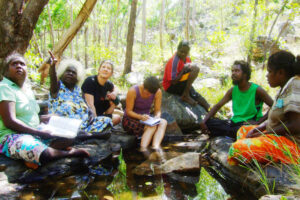Collaboration isn’t always easy – something we here at TERN know only too well! But experience has shown that scientists working collaboratively can deliver better outcomes. Some of the authors of our recently published book, Biodiversity and environmental change: monitoring, challenges and direction have challenged Australian ecologists to collaborate more, and more effectively, including with non-scientists. Their idea is that more collaboration with the broader public would lead to science projects with outcomes that are more readily understood, have greater potential for impact, and better reflect the diversity of our society.
They write: ‘The challenge for conservation is to set priorities and develop coherent policies that respect the diversity of interests held within our society while also maintaining environmental values for future generations.’
They argue that, if scientists better understood the concerns and needs of other groups in society, whether they make a living from the land, manage it, or enjoy the amenities of nature, they will have a better shot at conducting more relevant science that informs policy and practical management suggestions to protect the environment. Social, cultural and economic considerations will guide more useful and effective science.
The authors acknowledge that some scientists, including those who use TERN environmental monitoring systems, already work with non-scientists, but even then, the people and groups engaged tend to be from a narrow cross-section of society. Engagement with non-scientists is far from standard practice.
Part of the reason for the narrow scope of science stems from science’s own culture. What scientists study, and how they conduct their research, is influenced by many things: among them the demands of publication and its relationship to professional reputation and funding sucess; the focus on innovation and new technologies; and the culture of not sharing data. Much data is generated that is not being used but could have wider application.
The authors argue that we need to change how academic success is measured, so that collaboration and social engagement are embedded in all scientific endeavours. And scientists need to positively engage with the new philosophy of sharing data. TERN has developed tools and protocols that can help scientists and institutions share their data, while still being appropriately acknowledged for their work.
Science culture begins in the lab at school and university. The authors note that once it was common for students to go on field trips, which gave them not just hands-on learning about the subject but also the experience of being in and part of nature. But contemporary curriculum relies heavily on the lab and the computer. Thus science builds its own barriers against connection with nature.
‘A trend towards less time spent in the field is resulting in the detachment of biologists from nature,’ they write. The comment applies not just to others working in the ecological sciences, but to all Australians.
Engaging others in the work of science would go some way to alleviating current social concerns such as the perceived scepticism about the value of science. The authors discussed engagement from both sides of the fence: communicating with the public about their work and why it’s important, and eliciting from people their own ecological knowledge, which can be vast.
One obvious example covered in our book is in monitoring rangelands and other sparsely populated areas. Another is engaging with Aboriginal and Torres Strait Islander custodians about the management of their lands. Their accumulated knowledge of species and ecosystems goes backs tens of thousands of years, and western science has yet to adequately acknowledge that and learn how to collaborate to mutual benefit. Some TERN facilities do engage Indigenous land managers, but there is much scope to do better. It should, the authors argue, be part of the core business of ecological research.
TERN’s Australian Centre for Ecological Analysis and Synthesis (ACEAS) is one arrow in the quiver of an ecologist’s social arsenal. It is a catalyst for helping scientists share knowledge with other people they wouldn’t normally intersect with professionally, and thereby come up with new perspectives on problems.
Many people outside science are keen to contribute to scientific research: just look at the increasing interest of citizen science, which Transects for Environmental Decision Making (TREND), part of the Australian Transect Network, is devoting effort to.
While cultural trends change all the time, many ecosystem science questions require consistent long-term studies over decades. However, well-designed research infrastructure can permit even long-term research studies to be responsive to newly important issues. For example, five of the 12 plot networks in TERN’s Long Term Ecological Research Network (LTERN) were able to legitimately add new climate change questions to their research programs during the 2000s, even though the infrastructure had been established decades earlier.
Ecological science networks such as the international long-term ecological research community, of which TERN is a member, are beginning to recognise the importance of including human cultural needs in science. We’ve made a start, but there’s still much more that Australian ecologists could do to broaden and strengthen their collaborations. TERN is here to help.

Manwurrk Rangers and ANU researchers conducting two-way research in the Warddeken IPA, NT. With support from TERN’s ACEAS facility, Dr Emilie Ens and colleagues are making connections between age-old Aboriginal ecological and management knowledge and contemporary science and technology (photo courtesy of Sam Bentley-Toon).
Published in TERN newsletter February 2014







